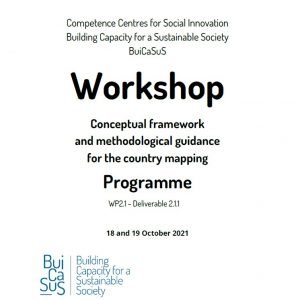Key relevant stakeholders from 4 Member States of the EU, have designed a relevant action to respond to current social challenges. The design of the project itself has implied the identification of suitable partners within the 27 EU Member States as well as the UK and Norway.
How it all started
The European Commission has called upon the Member States, their managing authorities of the European funds and organisations active in promoting social innovation, to come together to set up or reinforce institutional structures that can give expert support to managing authorities and national ecosystems to promote social innovation.
The design of the project itself has also implied the detection of suitable organizations, either Managing Authorities or organizations endorsed by the Managing Authorities and their partners, that would complement each other and contribute to a common project; the definition of a specific work plan as well as the respective responsibilities of each of the partners; the invitation to associate organizations to become part of the endeavour.
As a result, BuiCaSuS combines a great richness and solidity, involving partners representing a great regional diversity across Europe, including the North, Centre, and South; bringing a variety of organizational profiles, including public administration, not-for-profit, private, academia and public agencies; and planning actions that are ambitious yet feasible.
Social innovation for sustainable societies
BuiCaSuS aims to foster transnational experience exchange on the practice of social innovation to establish the conditions to create institutional structures for a national Competence Centre on Social Innovation (Spain and Latvia) or to strengthen existing
centres (Sweden and France).
In order to do this, the project will identify tools and methods, that have emerged from past experiences, including but not limited to the implementation of the European Structural and Investment Funds (ESIF) and the European programmes of EaSI and Progress.
BuiCaSuS works on three levels:
- Projects refer to specific operations. These are undertaken often in a territorially confined environment. Frequently they are focused on just one social subject matter. They bring together several actors, both public and private, some of which have a facilitating role as change-makers for social innovation.
- Actors refer to the different formal entities that apply methods of social innovation as their key mandate. They can be public or private, or hybrid mandated entities.
- Systems refer to national strategies and institutions that nurture ecosystems for social innovations and foster the publicly endorsed practice of social innovation by orienting actors through policies, funding, and targeted support
Today’s challenges for Social Innovation
Our societies face tremendous challenges derived from a number of megatrends. Climate change and loss of biodiversity, the digital transition, raising inequality and an erosion of traditional social fabrics, the care crisis, the corrosion of a shared public sphere and epistemic commons, population change by migration and ageing, amongst others.
Citizens experience a lack of security, protection, and belonging. New social needs and challenges proliferate.
The classic social welfare responses, administered by state bureaucracies, do not seem to be able to cover these. Much hope is deposited in social innovation that shall make societies more sustainable, resilient and habitable.
Follow us on this 2 year journey to push our goals forward!







